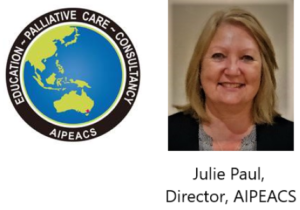
JULIE’S UPDATE: MAY 2025
今月は、引き続きアドバンス・ケア・プラニングに焦点を当てます。
2月は、緩和ケアの患者さんと医療チームとのコミュニケーションの重要性について考えました。4月には、患者さんの価値観や信条にとって何が大切かを理解するための会話のきっかけを検討しました。今月は、患者さんが将来どの様な医療ケアを望むのか、あるいは望まないのか、患者さんの視点を確認する際にどのような質問が考えられるかについて考えます。これらの質問には様々な方法があり、それぞれの患者さんにとって適切な質問であることを確認する必要があります。これまで述べてきたように、収集した情報を医療チーム内で共有し、患者さんのケアプランに盛り込み、定期的に患者さんと再確認することも重要です。
プロセスの進め方は人それぞれに異なることを忘れないでください。私たちは柔軟に、一歩ずつ進んでいく必要があります。患者さんは、最初は家族の同席なしで話すことを好むかも知れませんし、逆に家族が常に同席することを望むかもしれません。
オーストラリアのアドバンス・ケア・プラニングの概要については、以下のリンクを参照して下さい。(このリンクでは日本語でも提供しています。)
https://www.advancecareplanning.org.au/search2?query=japanese+translation
患者さんにとって、このような話し合いを行うことは、どのようなケアを受けたいか、どのような結果を望んでいるかを考え、話し合い、記録に残す機会となります。
アドバンス・ケア・プラニングの話し合いは、家族とケア提供者が患者さんにとって何が最も重要であるかを知り、患者さんの希望を尊重したケアの提供ができることであります。
以下のリンクでは、オーストラリアの4家族が、自分たちの経験からアドバンス・ケア・プラニングの価値について語っています。(設定をクリックすると、字幕を日本語に変換する事ができます。)
https://www.betterhealth.vic.gov.au/health/videos/advance-care-planning-starting-the-conversation
医療情報に関する話し合いを始めるには、さまざまな方法があります。
わたしはいつも、まず患者さんが自分の現在のケアや健康状態についてよく理解しているかどうかを確認します。患者の理解にギャップがある場合、医師と話し合いをしてもらう必要があります。患者さんが現在、そして将来的にどのような治療法を決定してほしいかを話し合うことが重要です。患者さんの中には、治療法の決定に関わりたい人もあれば、医師に任せたい人もあります。また、たとえ本人がまだ自分で治療法を選択できるとしても、家族にも医師と一緒に最善の治療法を決めてほしいと考える人もいるかもしれません。この点については、人それぞれ考え方が違うので、患者さんの希望を聴くことは重要です。
過去に重い病気を体験したことについて、患者さんに確認することも役立つかもしれません。また、患者さんの身近に、現在あるいは過去に重い病気や危篤状態におちいっている人がいたかも知れません。何が良く、何が良くなかったかについて患者さんと一緒に振り返ることは、患者さんの視点を理解するのに役立つかもしれません。
患者さんが現在、あるいは将来、どのようなケアを望んでいるのか、あるいは望んでいないのかについて、どのように話し合えば良いのか、いくつかのリンクをご紹介します。
・ アドバンス・ケア・プラニングの話し合いを準備するための一例として、患者さん 自身が、またはヘルスケアチームの助言に従って、将来の健康や個人的なケアの希望を記入する手引書です。
https://www.himc.com.au/resources/forms/Preparing_for_an_ACP_Conversation_HR.pdf
・アドバンス・ケア・プラニングの概要とその過程を示すビデオです。
(ページの下までスクロールし設定をクリックすると字幕を日本語に変換できる。)
・これは延命治療の利点と負担の比較を理解すること、CPR、人工呼吸器の装着、経管栄養、透析などの治療法についての話合いです。
https://www.advancecareplanning.org.au/understand-advance-care-planning/life-prolonging-treatments
この分野の他のリソースに興味があれば、お知らせください。
緩和ケアについてのあなたの考えや経験を分かち合い、お互いに学び合えることを楽しみにしております。
お元気で
ジュリー・ポール
OAM(オーストラリア勲位)
-
-
Disclaimer: MAY 2025 免責条項:
Julie’s Update シリーズ内の内容につき正確な情報の提供に細心の注意を注いでいますが、特にある事柄についての専門的意見を提供するものではありません。このシリーズに含まれる情報は、独立した専門家の見解に取って代るものではありません。また、医療上の助言として利用したり、何らかの疾患の治療、手当、又は、予防のために使用されるものではありません。
このシリーズにより提供される情報の利用、依存によるいかなる法的責任、怪我、紛失、損害については、責任は負いません 。
-
Julie’s Update: May 2025(原文)-
This month we will be continuing our focus on Advance Care Planning.
-
In February we reflected on the importance of communication with our palliative care patients and the Health Team. In April we reviewed conversation starters to help us start to understand what is important to the patients values and beliefs. This month we will reflect on the types of question you might consider when ascertaining a patient’s perspective on the type of medical care they may or may not want in the future. Reminder there are many different ways we can ask these questions and we need to ensure they are appropriately asked for each patient. As has been stated in previous updates, it is equally important to ensure the information gathered is shared within the health care team, included on the patients care plan and periodically revisited with the patient to ensure it is still current.
-
Reminder that everyone approaches the process differently. We need to be flexible and take it one step at a time. The patient may prefer to have the discussions initially without their family present or conversely they may prefer to have family present at all times.
-
For an overview of advance care planning in Australia please refer to the following link that provides this information in Japanese.
-
https://www.advancecareplanning.org.au/search2?query=japanese+translation
-
For patients completing these types of discussions provides an opportunity to think about, discuss and document their preferences for the type of care they would like to receive, and the outcomes they would consider acceptable.
-
Advance care planning discussions ensures families and health providers know what matters most to the patient and enables them to respect the patient’s treatment preferences.
-
https://www.advancecareplanning.org.au/understand-advance-care-planning/advance-care-planning-explained, accessed 27/4/25)
-
The following link details four Australian families talking about the value of advance care planning from their experiences.
-
https://www.betterhealth.vic.gov.au/health/videos/advance-care-planning-starting-the-conversation
-
(please click on the settings and you will be able to change the subtitles to Japanese)
-
-
-
There are lots of different ways to begin discussions related to medical information.
-
I always check first to ensure patients have a good understanding of their current care and health first. Where needed we need to ensure the Doctor has a discussion if there are any gaps in their understanding. It is important to discuss how the patient would want medical treatment decisions made now and in the future. Some patients like to be involved in medical treatment decisions, others would prefer to leave decisions about medical treatment up to their doctors. Others might want their family to decide about the best treatments for them with their doctors, even if they were still able to decide for themselves. Asking the patients preference is important as we all think differently on this aspect.
-
It may be helpful to check in with the patient about their past experiences with serious illness. They may have had someone close to them who is very sick or dying now or in the past. Reflecting with the patient about what went well and what did not go well may be helpful in understanding their perspective.
-
Here are some links with suggestions on how to have discussions with patients about the type of care they may or may not want now and in the future:
-
Preparing for an advance care planning conversation is an example of a guide that patients fill out themselves or with health team guidance about their wishes for future health and personal care.
-
https://www.himc.com.au/resources/forms/Preparing_for_an_ACP_Conversation_HR.pdf
-
-
-
-
- Making wishes known and respected video provides an overview of advance care planning process – scroll to bottom of page for video ( click on settings and you will be able to change subtitles to Japanese)
- https://www.caresearch.com.au/Health-Professionals/Nurses/Planning-and-Coordinating-Care/Advance-Care-Planning
- Understanding Life prolonging treatments including benefit versus burden of life prolonging treatments and discussion on specific treatments including CPR, artificial ventilation, tube feeing, and Dialysis.
-
If you are interested in more resources in this area, please let me know and I can forward them through to you.
Please let me know how you are going, as we enjoy sharing your thoughts and experiences on palliative care, so that we can continue to learn from each other.
Stay safe and take care.
Julie
Julie Paul
Order of Australia (OAM)
